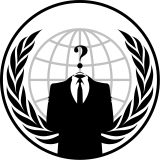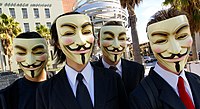Anonymous (group)
Anonymous is a decentralized international hacktivist group that is widely known for its various cyber attacks against several governments, government institutions and government agencies, corporations, and the Church of Scientology.
Anonymous originated in 2003 on the imageboard 4chan representing the concept of many online and offline community users simultaneously existing as an anarchic, digitized global brain.[2][3] Anonymous members (known as Anons) can be distinguished in public by the wearing of Guy Fawkes masks in the style portrayed in the graphic novel and film V for Vendetta.[4] However, this may not always be the case as some of the collective prefer to instead cover their face without using the well-known mask as a disguise. Some anons also opt to mask their voices through voice changers or text-to-speech programs.
In its early form, the concept was adopted by a decentralized online community acting anonymously in a coordinated manner, usually toward a loosely self-agreed goal and primarily focused on entertainment (or lulz). Beginning with Project Chanology in 2008—a series of protests, pranks, and hacks targeting the Church of Scientology—the Anonymous collective became increasingly associated with collaborative hacktivism on a number of issues internationally. Individuals claiming to align themselves with Anonymous undertook protests and other actions (including direct action) in retaliation against copyright-focused campaigns by motion picture and recording industry trade associations. Later targets of Anonymous hacktivism included government agencies of the U.S., Israel, Tunisia, Uganda, and others; the Islamic State of Iraq and the Levant; child pornography sites; copyright protection agencies; the Westboro Baptist Church; and corporations such as PayPal, MasterCard, Visa, and Sony. Anons have publicly supported WikiLeaks and the Occupy movement. Related groups LulzSec and Operation AntiSec carried out cyberattacks on U.S. government agencies, media, video game companies, military contractors, military personnel, and police officers, resulting in the attention of law enforcement to the groups' activities.
Dozens of people have been arrested for involvement in Anonymous cyberattacks in countries including the U.S., U.K., Australia, the Netherlands, Spain, India, and Turkey. Evaluations of the group's actions and effectiveness vary widely. Supporters have called the group "freedom fighters"[5] and digital Robin Hoods[6] while critics have described them as "a cyber lynch-mob"[7] or "cyber terrorists".[8] In 2012, Time called Anonymous one of the "100 most influential people" in the world.[9] In recent years, Anonymous' media profile has diminished.[10][11][12]
London Stock Exchange Lands On Anonymous’ Hit List
In May, hacktivist group Anonymous warned multiple financial institutions that it was going to take them down as part of Operation Icarus.
Late last week, on Thursday (June 2), the London Stock Exchange (LSE) found itself in the group’s crosshairs in the latest leg of the attack, reported Newsweek.
The stock exchange’s site reportedly experienced a two-hour disruption as the result of what is believed to be a DDoS attack carried out by the well-known hackers. An LSE spokesperson did not respond to Newsweek‘s request for comment, but there is no reason to believe any sensitive data was exposed.
“The attack on the London Stock Exchange is another example that no organization, no matter how big, is safe,” Andy Buchanan, VP at RES Software, told Newsweek. “In this instance, it appears trading was not affected and no sensitive data was stolen, but it is still very worrying.”
Perhaps more worrisome is the point which was broadcasted by Twitter user OpIcarus on Friday (June 3):
https://twitter.com/Op_Icarus/status/738758438512152576″ target=”_blank
Last month, it was well-known that Anonymous targeted the Bank of Greece on May 4 and the Central Bank of Cyprus just a few days later.
In the case of the Bank of Greece, an official stated: “The attack lasted for a few minutes and was successfully tackled by the bank’s security systems. The only thing that was affected by the denial-of-service attack was our website.”
Other reports last month indicated that additional victims included the Central Bank of the Dominican Republic, the Guernsey Financial Services Commission, the Dutch Central Bank, the Central Bank of Maldives, the Central Bank of Kenya, the National Bank of Panama, the Central Bank of Bosnia and Herzegovina, the Central Bank of Mexico, the Reserve Bank of New Zealand and the National Reserve Bank of Tonga.
“Like Icarus, the powers that be have flown too close to the sun, and the time has come to set the wings of their empire ablaze and watch the system their power relies on come to a grinding halt and come crashing down around them,” last month’s May 8 video stated.
Anonymous had pegged Operation Icarus as a 30-day campaign, and while those final days are ticking down, there’s no telling what the final hours could bring. However, it does seem that the group’s concerns have shifted for the time being, with a new video posted on Saturday (June 4), announcing Operation Harambe, a mission that has nothing to do with banks.




Aucun commentaire:
Enregistrer un commentaire